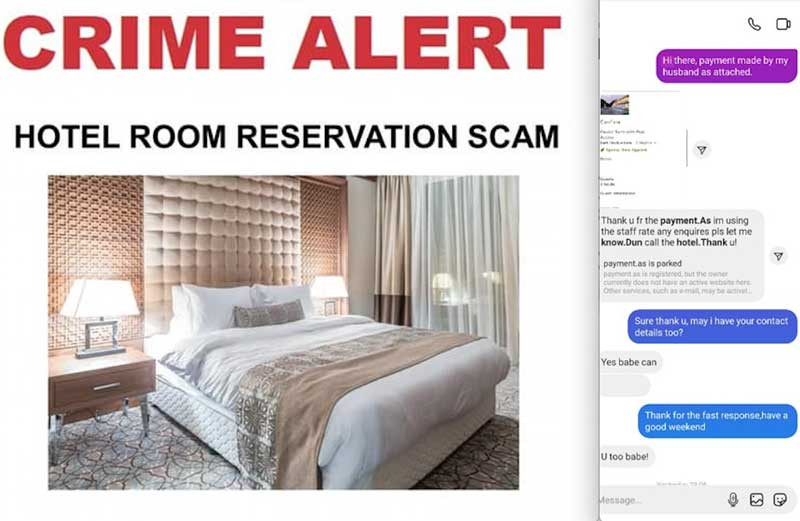
One of the biggest holiday 2023 scam is people booking a place for a short-term stay only to find out upon arrival that it either does not exist or is not available for rental or occupation.
From Kariba, Inyanga, Harare and other holiday resorts, these short-term rentals are fast become holiday hotbeds of scammers and fraudster for travellers and hosts.
Whether you are looking to escape to a cottage, holiday, lodge or are eager to rent out your riverside bungalow in Kariba, Inyanga, etc you can be sure there are bad actors ready to waylay your plans and make a quick dollar from properties advertised.
Zimbabweans are now experiencing vacation nightmares where reality did not live up to expectations as short-term stay scammers and fraudsters are now using social media platforms such as facebook, whatsApp instagram, X , youtube, the internet and email marketing.
Short-term stay scams refer to fraudulent activities targeting individuals who are looking for temporary accommodations, such as vacation rentals, short-term accommodation, or hotel bookings.
Scammers exploit the demand for such accommodations and use various tactics to deceive unsuspecting victims, especially during the holidays and festive season where demand is high.
Some of the common short-term stay scams to be aware of include:
Fake listings
- Title rivals face tough weekend
- Interactive feedback : In pursuit of a non-binary narrative
- DeMbare, FC Platinum fight for Chibuku Cup
- ZVDT laments lack of development in Zambezi Valley
Keep Reading
Scammers create fake listings on online platforms, advertising attractive accommodations at low prices.
These listings often feature stolen photos and descriptions from legitimate properties or hotels.
When victims book these accommodations, they either end up with a non-existent property or a substandard alternative.
Bait-and-switch
In this scam, the scammer advertises a desirable property or hotel room, but once the victim arrives, they are informed that the property is unavailable or in poor condition.
The scammer then tries to upsell them to a more expensive option.
Phishing scams
Scammers may send emails or messages posing as legitimate booking platforms, hotels, or property owners.
They request personal information or payment details, tricking victims into sharing sensitive data that can be used for identity theft or other fraudulent activities.
Payment fraud
Scammers may request direct payment outside of the legitimate booking platform using mobile money transfer, money transfer services, cryptocurrency, or other untraceable methods.
Once the payment is made, the victim realises that the booking does not exist or was never confirmed.
Impersonation
Scammers may pose as genuine property owners or agents, using stolen identities or creating fake personal details.
They communicate with victims, offer accommodations, and collect payments, leaving the victims without a place to stay.
To protect yourself from short-term stay scams, consider the following precautions:
Use reputable platforms
Book accommodations through well-known and trusted platforms or reputable online hotel chains to minimise the risk of falling victim to fraudulent listings.
Verify the listing
Research the property or hotel independently. Look for reviews, check the property's official website, and compare the information provided in the listing with other sources to ensure its authenticity.
Secure payment methods
Whenever possible, use secure payment methods such as credit cards or reputable online booking platforms that offer payment protection.
Avoid direct wire transfers or cash payments, as they are harder to recover if a scam occurs.
Beware of Unsolicited Contact: Be cautious of unsolicited emails, messages, or phone calls claiming to offer accommodations.
Verify the legitimacy of the sender and never share personal or financial information through unsecured channels.
Trust your intuition
If something feels suspicious or too good to be true, trust your instincts. If a deal seems unusually cheap or the communication raises red flags, consider looking for alternative options.
If you suspect you have encountered a short-term stay scam, report it to the relevant authorities, such as law enforcement, the regulators, the platform where the booking was made, or the hotel management.
By reporting the scam, you can help prevent others from becoming victims as well.
With short-term cyber crimes on the increase. Law enforcement agencies around the world have recognized the need for specialized units to address online crimes.
With the rise of the internet and digital technologies, cybercrime has become a prevalent and complex issue that requires focused attention and expertise.
Zimbabwe need to establish a separate use for these kind of crimes, which is now the norm around the world.
By establishing a separate unit to deal with online crimes allows law enforcement to effectively investigate, prevent, and combat various forms of cybercrime like these short-term rental scams.
It is worth noting that many law enforcement agencies already have specialized units or task forces dedicated to cybercrime.
However, as technology continues to evolve, it is crucial for these units to adapt and stay ahead of cybercriminals to ensure an effective response to online crimes.
If you want advise on how to protect yourself against short-term rental scams please
WhatsApp/call +263772278161 or email [email protected].
Mutisi is the CEO of Hansole Investments (Pvt) Ltd. He is the current chairperson of Zimbabwe Information & Communication Technology, a division of Zimbabwe Institution of Engineers.







